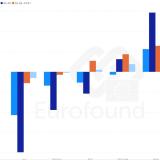
Emploi et marchés du travail
L’emploi et les marchés du travail comptent parmi les six activités principales à l’ordre du programme de travail d’Eurofound pour la période 2021-2024. Eurofound continuera de servir de centre d’expertise pour le suivi et l’analyse des évolutions du marché du travail, tout particulièrement à l’heure où les marchés du travail européens sont confrontés à d’importants défis causés par la pandémie de COVID-19. Ses activités de collecte de données et de recherche se concentreront sur les conséquences de la pandémie sur le travail et l’emploi et sur les moyens de garantir le fonctionnement ainsi que le caractère inclusif du marché du travail.
Pendant la période 2021-2024, les recherches d’Eurofound fourniront des informations importantes sur les défis et perspectives dans le domaine de l’emploi et des marchés du travail dans l’UE. Eurofound a un rôle important à jouer dans le suivi des tendances du marché du travail, ainsi que dans l’analyse de l’impact de ces tendances sur différents groupes de travailleurs.
Les recherches mettront principalement l’accent sur l’évolution structurelle du marché du travail en s’appuyant sur les instruments de surveillance réputés d’Eurofound – l’ Observatoire européen de l’emploi (EJM) et l’ Observatoire européen des restructurations (ERM) – en plus des données d’Eurostat. Dans la mesure où l’on s’attend à des taux de chômage élevés dans certains pays, régions, secteurs et professions, qui affecteront également les travailleurs les plus précaires et les plus vulnérables, ces instruments permettront d’identifier les secteurs, professions et qualifications en croissance ou en déclin. Par ailleurs, l’ERM poursuivra son étude des activités de restructuration de grande ampleur, des instruments juridiques et de soutien, de même que des mesures élaborées par les partenaires sociaux et les autorités publiques pour aider les travailleurs en pleine transition vers un autre emploi ou secteur.
Eurofound axera également ses activités sur les pénuries de main d’œuvre et la sous-exploitation des ressources humaines et des talents dans certains secteurs et professions, qui se sont accentuées durant la crise de la COVID-19, en examinant les interventions politiques et les pratiques des entreprises. L’ inadéquation entre l’offre et la demande de compétences , le temps de travail , la mobilité géographique ou professionnelle et l’ intégration des migrants figureront au rang des thèmes abordés, qui couvriront aussi des groupes sous-représentés sur le marché du travail tels que lesjeunes, les femmes et les personnes handicapées . De plus, Eurofound se penchera sur les secteurs habituellement touchés par les pénuries de main-d’œuvre, cette problématique devenant plus urgente en raison de la pandémie. Cette activité alimentera les travaux préparatoires pour la prochaine édition de l’ enquête sur les entreprises en Europe (ECS) .
Eurofound poursuivra en outre sa collaboration avec le Centre commun de recherche (CCR) de la Commission européenne dans ce domaine. Les recherches sur les restructurations contribueront aux activités du Fonds européen d’ajustement à la mondialisation (FEAM) et au Fonds social européen plus (FSE+). Eurofound s’appuiera sur sa relation avec son agence sœur, le Cedefop, et l’Autorité européenne du travail dans le domaine des compétences et de la mobilité de la main-d’œuvre pour promouvoir des politiques d’emploi visant à combattre les pénuries de main d’œuvre.
- Infographie: Emploi et marchés du travail dans l’UE























